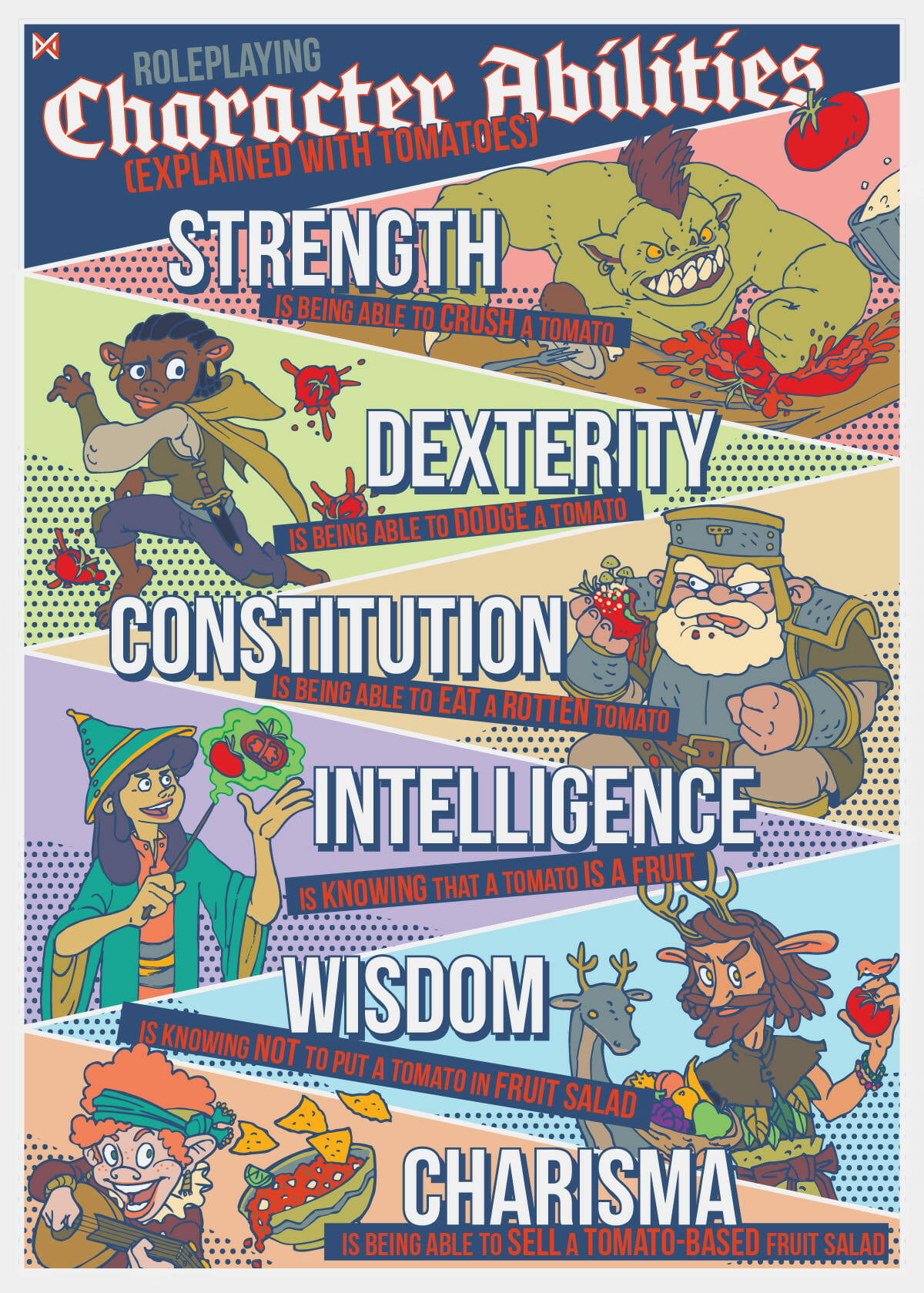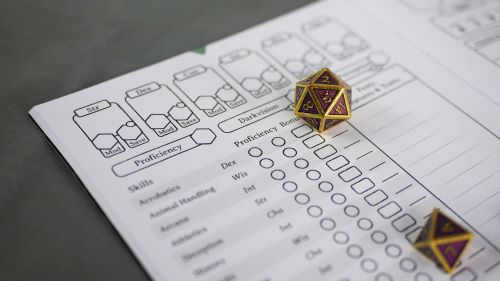Dungeons and Dragons (D&D) is not only a game of fantasy and adventure but also a platform that explores the diverse abilities that define characters. In today’s article, we delve into the six primary attributes of D&D—Strength (STR), Dexterity (DEX), Constitution (CON), Wisdom (WIS), Intelligence (INT), and Charisma (CHA). Ultimately, with the aim of uncovering their relevance to the business world. As a player in D&D, understanding these abilities and their impact on the game allows creation of a character that has a strong chance of success. Likewise, by understanding how each attribute relates to essential qualities and skills in business, individuals can harness their own strengths and develop a well-rounded approach to professional success.
Strength (STR): Power in Action
Strength in D&D represents physical prowess, raw power, and the ability to overcome challenges. Characters with high STR scores would be Conan the Barbarian, Buffy the Vampire Slayer or Aragorn from Lord of the Rings.
In the business world, strength translates into action-oriented leadership, resilience, and the ability to navigate and overcome obstacles. Individuals with high STR traits exhibit determination, drive, and the physical and mental fortitude required to persevere in demanding and competitive environments. Entrepreneurs and construction managers exhibit this trait, as leaders dealing with fast paced highly fluid situations every day.
Dexterity (DEX): Agility and Adaptability
The Dexterity attribute encompasses agility, nimbleness, and reflexes. Sneaky rogues and accurate archers are characters with high DEX. Think Robin Hood or Jyn Erso from Rogue One.
In leadership, DEX translates into adaptability, quick thinking, and the ability to respond swiftly to changing circumstances. Individuals with high DEX traits exhibit flexibility, strategic thinking, and the capacity to navigate complex situations with grace and efficiency. Development managers in the IT sector and project managers of all scales must have high DEX to succeed.
Constitution (CON): Resilience and Endurance
Constitution reflects resilience, stamina, and the ability to withstand physical and mental challenges. Within the game this equates to more hit points and thus makes your character harder to kill. Ellen Ripley from Alien and Ethan Hunt from Mission Impossible display huge levels of constitution and fortitude.
In the real world, CON translates into resilience, perseverance, and the capacity to endure setbacks and overcome adversity. Individuals with high CON traits exhibit determination, emotional stability, and the ability to maintain focus and performance in high-pressure situations. Successful leaders with high CON bounce back from failure stronger than ever before. For real world examples think Elon Musk or JK Rowling of Harry Potter fame.

Wisdom (WIS): Insight and Decision-Making
Intuition, perception, and the ability to make sound judgments fall out of a high WIS attribute. From a players perspective these characters are often Clerics, wise in the ways of the world. In fiction characters with high WIS often take the form of mentors. Dumbledore and Yoda are great examples from popular culture and need no introduction. A character with high WIS who is most definitely not a mentor is Tyrion Lannister from Game of Thrones. Throughout the series Tyrion displays great wisdom, finding inner peace where his flaws are concerned and recognizing his great power lies in his ‘smart brain’.
WIS translates into insightful decision-making, problem-solving, and the capacity to evaluate situations holistically. In the business world, individuals with high WIS traits possess keen observation skills, intuition, and the ability to navigate ambiguity and make informed choices. Often leaders with high WIS act as mentors. However, positions where a large number of conflicting stakeholders are involved also need this attribute. Any leadership position in a government department or other bureaucracy must have this to succeed.
Intelligence (INT): Knowledge and Analytical Thinking
Intelligence for a D&D character signifies intellectual acumen, knowledge, and the ability to process information. Since the first days of the game INT has bee important for Wizards as they research the arcane. Over time this has ported to alchemists, artificers and bards. It comes as no surprise that fictional characters like Gandalf, Spock and Hermione Granger display intelligence as their primary attribute.
When looking at real world professionals, INT translates into analytical thinking, strategic planning, and the capacity to gather and apply knowledge effectively. Individuals with high INT traits exhibit strong problem-solving skills, critical thinking abilities, and the capacity to make informed decisions based on data and insights. Leaders with this primary attribute excel in running teams and projects with a high level of technical complexity. They should also be included when formulating long term strategic plans for the business or division.
Charisma (CHA): Influence and Relationship-Building
Charisma in D&D represents charm, persuasiveness, and the ability to influence others. In the game this is often used to avoid deadly combat situations. Fast talking Bards, inspirational Paladins and silver tongued Warlocks all benefit from having a high CHA attribute. In the business world, CHA translates into effective communication, relationship-building, and the capacity to inspire and motivate others. In the movies Tony Stark, James Bond, Jack Sparrow and Princess Leia all have high CHA scores.
Leaders with high CHA abilities possess strong interpersonal skills, the ability to communicate ideas effectively, and the capacity to build rapport and influence outcomes. This is particularly important if you have a large team so that messages are clear and easily understood. A leader with the ability to communicate a strong and compelling vision to his team can create strong loyalty and collaboration. Think Elon Musk or Steve Jobs and see what they have achieved by using this attribute.
Final Thoughts
The six abilities of Dungeons and Dragons—Strength, Dexterity, Constitution, Wisdom, Intelligence, and Charisma—hold valuable lessons for leaders. By understanding and harnessing these attributes, individuals can identify their strengths and develop the qualities necessary for success. Whether it’s leveraging physical and mental fortitude, adapting to changing circumstances, building resilience, making informed decisions, applying analytical thinking, or fostering effective communication and relationship-building, the attributes of D&D can empower individuals to thrive and excel as leaders in the real world.

